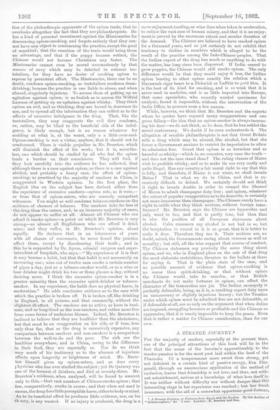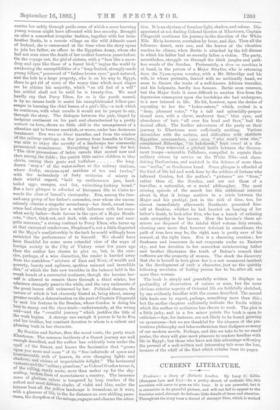A STRANGE JOURNEY.* FOR the majority of readers, especially at
the present time, one of the principal attractions of this book will lie in the fact that the scene of the heroine's apprenticeship to the master-passion is for the most part laid within the land of the Pharaohs. Of a temperament more sweet than strong, yet not deficient in a certain kind of passive energy, Eva Fitz- gerald, through an unconscious application of the method of exclusion, learns that friendship is not love, and thus, not with- out astonishment, arrives at a knowledge of what love itself is. It was neither without difficulty nor without danger that this interesting stage in her experience was reached ; but her frank innocence, with the aid of a somewhat opportune good-fortune,
• A Strange Journey. or Pictures from Egypt and the Soudan. By the Author of " Commonplace," &o. 3 vole. London : R. Bentley and Son.
carries her safely through perils some of which a more knowing young woman might have affronted with less security. Brought up after a somewhat irregular fashion, together with her twin- brother Bertie, in a remote village on the wild Atlantic coast of Ireland, she is summoned at the time when the story opens to join her father, an officer in the Egyptian Army, whom she had not seen since the death of her mother fourteen years before. On the voyage out, the girl of sixteen, with a "face like a snow- drop and eyes like those of a forest bird," begins the world by awakening the susceptibilities of a "long-limbed, strongly-made
young fellow," possessed of "listless brown eyes," good, natured, and the heir to a large property, who is on his way to Egypt, there to get rid of some of the weary time which must elapse
ere he attains his majority, which "an old fool of a will" has settled shall not be until he is twenty-five. We need hardly say that Percy Elton, for so is the youth named, is by no means loath to assist his unsophisticated fellow-pas- senger in learning the chief lesson of a girl's life,—a task which he continues, with what results it would not be proper to say, through the story. The dialogue between the pair, tinged by incipient sentiment on his part and characterised by a pretty naivete' on hers, shows no little skill in the management of a situation apt to become mawkish, or worse, under less dexterous treatment. Eva was no Masi traveller, and from the window of the railway carriage, on the journey from Ismailia to Cairo, was able to enjoy the novelty of a landscape too commonly pronounced monotonous. Everything had a charm for her. The slow processions of laden camels that moved now and then among the fields ; the quaint little native children in blue shirts, among their goats and buffaloes the long- drawn moy-a ' of the water-sellers at the railway stations, where dusky, anxious-eyed maidens of ten and twelve,"
with the melancholy of forty centuries of misery in their wistful regard, "held up earthenware jars, hard- boiled eggs, oranges, and fiat, uninviting-looking bread," But a bare glimpse is afforded of European life in Cairo to- wards the close of Ismail's viceroyalty. Eva, among the free- and-easy group of her father's comrades, over whom she uncon- sciously obtains a singular ascendancy—her fresh, !sweet inno- cence had already given her a subtle inflaence with her some- what seedy father—finds favour in the eyes of a Major Heath- cote, " short, thick-set, and dark, with restless eyes and ener- getic manners," a strong contrast to Percy Elton, who turns up at that universal rendezvous, Shepheard's, not a little disgusted
at the Major's coadjutorehip in the task he would willingly have restricted the performance of to himself. We should have been thankful for some more extended view of the ways of foreign society in the City of Victory some few years ago than the author has chosen to give us, but, in the exer- cise, perhaps, of a wise discretion,, the reader is hurried away from the matchless " mixture of East and West, of wealth and poverty, beauty and ugliness, spotless raiment and incredible dirt," of which the fate now trembles in the balance held in the rough hands of a successful mutineer, though the heroine her- self is allowed to remain there through a third winter, her admirers strangely passive the while, and the very rudiments of the great lesson still unlearned by her. Political changes, the
nature of which is but obscurely hinted at, bring about, among greater results, a determination on the part of Captain Fitzgerald to seek his fortune in the Soudan, where Gordon is doing his best to stamp out the slave-trade—unfortunately, at the wrong "(1---and the " eventful journey" which justifies the title of the work begins. A strange one enough it proves Co be to Eva and her brother, her constant devotion to whom is a salient and pleasing trait in her character.
By Suakin and Berber, then the usual route, the party reach Khartoum. The common incidents of a Desert journey are well enough described, and the author has evidently been under the spell of the Desert, and knows the fascination that "grows upon you more and more of its " free infinitude of space and Itneasurable arch of heaven, its ever changing lights and shadows, and visions of imperishable delight." The horizontal
vastness and the "solitary grandeur," as Colonel Gordon terms it, of the rolling, sandy waste, more than makes. up for the sky- scaling, broken lines t of mountainous a country. The immense softest and mostdecloieonr is tempered by long reaches of the intense heat all the yusetuove‘shades of violet and blue, under the
with glamour of life, landscape is tremulous, as it were, in the far distance an ever shifting pano- rama, the deception of the mirage, engages and chums the atten-
tion. It is an elysium of formles s light, shadow, and colour. Dis- appointed at not finding Colonel Gordon at Khartoum, Captain Fitzgerald continues his journey in the direction of the White Nile. He is, however, overtaken by fever, and dies. Then all the followers desert, save one, and the horror of the situation reaches its climax, when Bertie is attacked by the fell disease to which his father had so recently fallen a victim, The party, nevertheless, struggle on through the thick jungles and path- less woods of the Soudan. Fortunately, a dens es nsaehina is at hand, in the person of a Major Smythe, who is returning from the Nyam.nyam country, with a Mr. Etheridge and his wife, in whose portraits, limned with no unfriendly hand, we seem to discern, the traits of a well-known African traveller, and his helpmate, hardly less famous. Bertie soon recovers, but the Major finds it more difficult to awaken Eva from the depression consequent upon the hardships she had undergone, to a new interest in life. He hit, however, upon the device of repeating to her the " Lotus-eaters," which, recited in a "deep, pleasant voice," "by a tall and splendidly-propor- tioned man, with a clever, sunburnt face," blue eyes, and abundance of hair, "all over his head and face," had the desired effect. The further adventures of the party on their journey to Khartoum were sufficiently exciting. Various skirmishes with the natives, and difficulties with stubborn Egyptian commanders, ram ayes, " who won't even rise," complained Etheridge, "to baksheesh," kept ennui at a dis- tance. They witnessed a pitched battle between the Govern- ment troops—miserable Fellaheen, compelled to expiate their military crimes by service on the White Nile—and slave- driving Darfourians, and assisted in the defence of more than one scribe," or Soudanese kraal. Some glimpse is afforded of the kind of life led and work done by the soldiers of fortune who followed Gordon, but the author's " pictures " are "from," rather than of, the Soudan, and are not those of a traveller, a naturalist, or a social philosopher. The most stirring episode of the march has this additional interest about it, that it brings matters to a crisis between the Major and his prot6gd, just in the nick of time, too, for almost immediately afterwards Heatheote presented him- self at Suakim, whither he had hurried on hearing of her father's death, to look after Eva, who has a knack of enlisting male sympathy in her favour. How the heroine's three ad- mirers are disposed of the fateful third volume duly reveals, showing once more that however deficient in smoothness the path of true love may be, the right man is pretty sure of his reward, at the right time. Eva is a charming creation ; her freshness and innocence do not evaporate under an Eastern sky, and her devotion to her somewhat uninteresting father and brother illustrates the truth of Balzae's remark that sufferers are the property of women. The shock the discovery that she is herself in love gives her is a not unnatural ineident in the development of such a character, just as the quickly following revulsion of feeling proves her to be, after all, not more than woman.
The book is simply and gracefully written. It displays no profundity of observation of nature or man, but the more obvious exterior aspects of Oriental life are faithfully sketched, by one evidently familiar with the scenes described, The second title leads one to expect, perhaps, something more than this ; but the earlier chapters sufficiently indicate the limits -within which the author or authoress has chosen to work. The plot is a little jerky, and in a few minor points the book is open to criticism—figs, for instance, are not likely to be found growing on sycamores—but we are thankful for the absence of the pre- tentious philosophy and false mstheticism that disfigure so many of oar modern novels. Perhaps, and this we take to be no small praise, the story will give most pleasure to readers familiar with life in Egypt ; but those who have not this advantage will enjoy the perusal of a well-written and interesting tale none the less, because of the whiff of the East which exhales from its pages.































 Previous page
Previous page